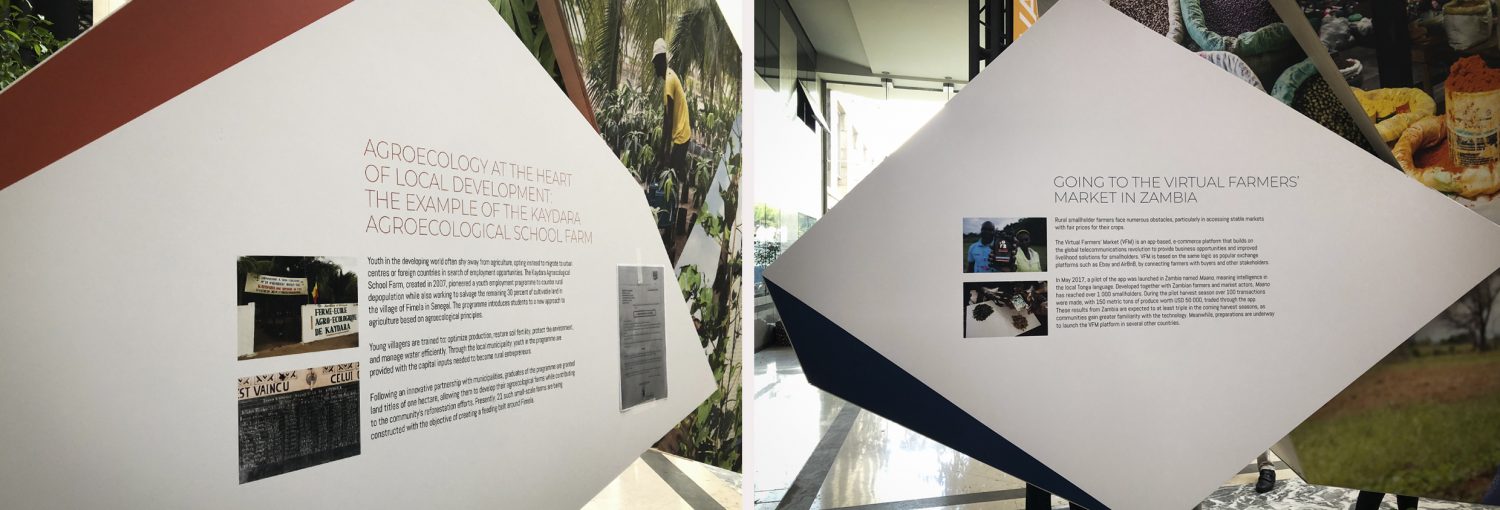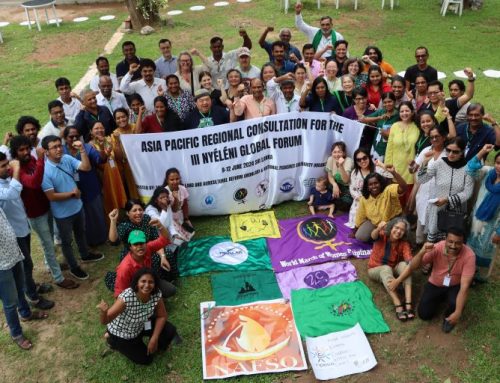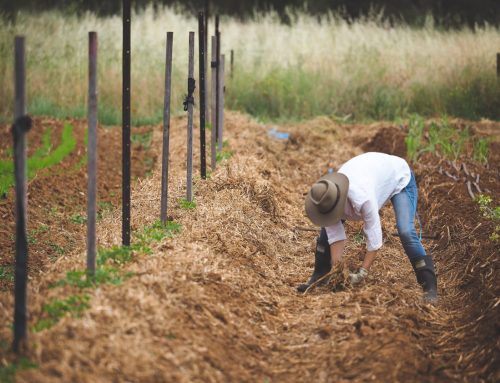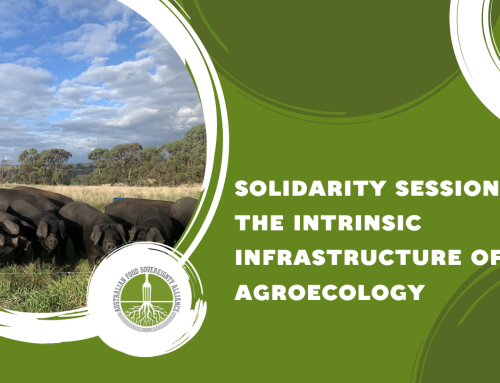Report on AFSA’s attendance at the FAO Symposium on Agricultural Innovation for Family Farmers: Unlocking the potential of agricultural innovation to achieve the Sustainable Development Goals
FAO Headquarters, Rome, 21–23 November 2018
Katie Johnston
Vice President, AFSA
Background
AFSA is a member of the International Planning Committee for Food Sovereignty (IPC), a global alliance of grassroots civil society organisations that work to uphold the rights of peasant farmers, fisherfolk, rural women and youth, the landless, traditional food gatherers and eaters, pastoralists and herders, and indigenous peoples. Working for the principles of food sovereignty, the IPC has, since 2003, provided the Food and Agriculture Organisation of the United Nations (the FAO) with expert advice, relating specifically to the on-ground needs and demands of these peoples, and specifically in relation to family farming. In addition to working closely with civil society, the FAO are also bound, via donations and the context of the member states, to work with government, private enterprise, and research organisations. The IPC represents the people working in food production outside these areas (though some members do work in research organisations that support community development and food sovereignty).
In November 2018, the FAO held the Symposium on Innovation in Family Farming at the FAO Headquarters, Rome, which I attended. This symposium followed on from the international symposium on The Role of Agricultural Biotechnologies in Sustainable Food Systems and Nutrition, held in February 2016 at the same location. In the interim, the FAO held a regional meeting on Agricultural Biotechnologies in Sustainable Food Systems and Nutrition in Asia-Pacific, in Kuala Lumpur, Malaysia in September 2017. Follow-on regional meetings in Sub-Saharan Africa, Latin America and the Caribbean, North Africa and the Near East where scheduled for 2017-18 after this Asia-Pacific meeting but did not go ahead. In short, the IPC members who attended this meeting (of which AFSA was one) were so effective at raising questions about the nature of biotechnologies in a genuinely sustainable and democratic food system at this regional conference that the donors for the subsequent regional meetings decided not to go ahead with the funding. As a result, the FAO effectively ‘re-launched’ the international conference under the new title of ‘Innovation in Family Farming’. So here we are.
As a member if the IPC, I also attended three days of strategising, pre-symposium, which allowed the group to craft key points on our definition of innovation, and the collective message we were committed to putting forward during the sessions. We also heard member stories regarding developments in agricultural innovation and updates around increased centralised control and corporatisation of the food system. Another great reminder for me on the importance of collective action and how working together for a common purpose serves to be so effective. This was also a chance for me to really understand how the outcomes of food sovereignty (or lack of, in a lot of cases) differ wildly from country to country. For example, in Australia we face issues such as regulation being ineffective or inappropriate for small-scale farmers, land being mismanaged as a result of our government’s focus on Big Ag, and deep injustices towards our First Nations people and loss of knowledge of traditional food systems. While many IPC members also expressed similar concerns, they also told stories of gross injustices towards farmers, such as one Uruguayan member detailing the deaths (murder) of 80 of their farm leaders in his region in the last two years. For me, hearing stories like this really reminded me of the importance of why AFSA is involved in this international work and of our collective mission to fight for food sovereignty.
What does ‘innovation’ mean for AFSA, and for the members of the IPC?
As with all issues relating to food and rights, AFSA assesses ‘innovation’ with reference to the six pillars of food sovereignty:
- Focuses on food for people – food must be nutritious and culturally appropriate, which can only be possible when production is diversified, and specific to each locality, and in relation to community needs. It is not possible when food is commodified and food systems homogenised – innovation must focus on building resilience and diversity, not simply improving efficiency or supporting scalable models.
- Values food providers – smallholder and family farmers must be included in discussions about appropriate innovation and technologies, not simply marketed to. They must be seen and listened to and considered as definitive decision makers on technical innovations relating to food sovereignty and production.
- Localises food systems – food must be seen first as community sustenance and only secondarily as something to be traded further afield. Innovation must ensure that local and regional needs are met before the supply of distant markets.
- Localises control – innovation must enable smallholder and family farmers to value, use and share resources local to their territories, lands and waterways in socially and ecologically sustainable ways and efforts must be by made by all stakeholders, critically government bodies, to recognise and respect these means of control. Privatisation of resources is not considered innovation under the tenets of food sovereignty.
- Builds knowledge and skills – innovation must foster exchange of knowledge and enable community development for family farmers. This includes traditional knowledge of skills, methods and seeds, as well as community-developed new practices. Technologies that undermine this ability are rejected. Instead, innovations should involve appropriate research and research systems in close cooperation with family farmers and other small-scale food producers to support the development of agricultural and other food-production knowledge, skills, methods and inputs with, by, for and among family farmers and other small-scale producers.
- Works with nature – innovation must protect natural resources, promote biodiversity and reduce greenhouse gas emissions and where required, focus on the regeneration of depleted landscapes. As such, the promotion of agroecological farming methods are key, and industrial farming methods that damage the environment and the health of those that inhabit it are to be avoided, and should not be considered as innovative.
What did the Symposium deliver?
The Symposium on Agricultural Innovation for Family Farmers hosted approximately 600 people, comprised of roughly 76 government delegates, 300 NGO representatives and the remainder a mix of academics and private sector attendees. Held over three days, the Symposium comprised a number of plenary sessions with various speakers, six parallel sessions made up of four panel speakers per session and an ‘Innovation Fair’ held throughout the symposium to highlight global examples of innovation in family farming. Each session was chaired and two United Nations Rapporteurs recorded the proceedings. Chair summaries from each parallel session informed the final Chair Summary, which would inform the report released by the FAO after the Symposium.
The opening plenaries set the scene for what the IPC members had assumed would be another, slightly veiled iteration of the promotion of biotechnologies in the food system. Several speakers highlighted innovation in terms of regional-specific solutions and the importance of capacity building. These included Jaana Husu-Kallio, the Permanent Secretary of the Finnish Ministry of Agriculture and Forestry, who spoke of the Finnish government’s decision in the 1940’s to purchase food from local producers to implement their free school lunch program, a program that continues to this day and has improved health and social outcomes for Finnish students. Anil Gupta, Founder of the Honey Bee Network in India also discussed the importance of grassroots experimentation for family farmers, cross pollination of knowledge and ideas and open source networks for farmer technologies. He spoke of both the power of technology to create meaningful and empowered change, but also of the need to implement the precautionary principle, in regards to technology in the hands of people and corporations who seek to exploit its use for profit only. These discussions were in line with AFSA and the IPC’s views on innovation and technology centred around democracy, community development, capacity building and knowledge sharing.
We also heard from some speakers in the opening plenaries whose visions for what ‘innovation’ and indeed ‘family farmers’ do and should look like did not align with ours. Marco Gualtieri, the Founder and Chairman of Seeds & Chips, Milan, presented on ‘Driving the future of food: Innovation, millennials and technology’. He gave no indication in his presentation of what his company does (from what I could garner from the internet, they are a start-up that aims to foster new innovations in the food system but I am still unclear on what they actually do), and his presentation focused heavily on the ability of technology to meet the needs of “young farmers” in order to “make agriculture sexy again”. His slides showed women using mobile phones and operating drones and he discussed the pressing need to “feed the world” and invest in high tech solutions. Interestingly, he did not mention family farmers once during his time on stage and although he threw in the need to have a “holistic vision”, many of us were left baffled by his stage tagline, “Let’s Get This Done!” This catch cry was thrown at the audience a few times with most of us left wondering, “get what done?” I am still unsure at the time of writing.
Yeming Wang, General Manager of tech giant Alibaba International (who have expanded into the online and physical food retail markets recently) graced the stage to discuss ‘Tackling the global imperatives for sustainable development using artificial intelligence’. Again, no mention of family farmers throughout his presentation, but he did show a video of ‘farmers’ in a Chinese city-based laboratory monitoring swine health to avoid disease. Apparently, they take the pigs outside to forest-bathe and play with balloons occasionally (although I fear just for the purpose of recording this film), but rest assured the laboratory-dwelling pig minders keep their lab coats on at all times. He also mentioned that Alibaba’s gross annual profit is equivalent to the GDP of the country ranked 20th in the world (Switzerland, in case you’re interested). I don’t know how true this is or if it was just a showpiece, but also consider that this would mean that a transnational corporation makes more money per year than every country listed from 21 down in GDP rankings. Anyway, back to innovation in family farming, which we have been torn away from for the entire duration of this man’s speech.
We also heard how considerable donations from countries with sizeable agri-tech portfolios had helped fund the Symposium, which raises questions around what the FAO and its member countries are expected to provide in return, and also around how balanced the proceedings could ever have been based on these contributions.
To our surprise, the parallel sessions did not prove to be as full of self-deluded grandeur or false promises of solutions not at all specific to family farmers as we had anticipated. A welcome relief. I attended three sessions with panellists including farmer organisation and association leaders, academics, private agricultural operators/managers, activists, government representatives and agricultural researchers. Broadly, the focus from people from developing countries was on capacity building, ensuring the preservation of local skills and knowledge and retaining control over means of production, while the focus from people from developed countries, in particular the United States (given that people from the US disproportionately represented people from developed countries on the panels), was on high-tech solutions that would increase scalability and efficiency in order to ‘feed the world’. One particularly noteworthy USDA panellist outlined her idea of innovation as being her ability to order her Turducken online at Christmas (the one time in the year when she cooks, she doesn’t like to otherwise), from a company six states away from the one she lives in. She was also impressed at how her requirement for Chinese vegetables at this time of year can be fulfilled by farmers from countries outside the US, or at the very least, across the country. That, to her, was the very definition of innovation, but thankfully, this varied wildly across panellists, with many discussing the need for inclusion of family farmers in decision-making processes, support for family farmers to innovate via funding and other means of support, capacity building for local communities, appropriate monitoring and assessment of technologies and context-specific learning and innovations.
Symposium outcomes
For anyone unfamiliar with FAO Symposium proceedings, sessions are held for discussions on pre-determined topics, comprising of eight (in this case) total panellists, after which the session moderator opens the floor to questions from ‘sectors’ of society – farmers, civil society organisations, research institutions, government bodies, and private enterprise. During this time, representatives from each sector make ‘interventions’, or comments on the discussions. Each session has notes taken by the UN Rapporteurs and these notes inform the Chair’s Summaries for each session, and in turn, the final Chair’s Summary for the Symposium.
One of the key messages that members of the IPC crafted pre-symposium, is that agroecology is a viable solution to feeding the world, as it holds up under all the food sovereignty tenets. During the parallel sessions, while agroecology wasn’t spoken about often during the panel discussions, it was mentioned numerous times during the intervention period, by all sectors (farmers, civil society, research institutions, government), with the exception of private enterprise. This in itself is a telling indication that a solution such as agroecology benefits all members of society with the exception of those whose sole requirement is to create profit. These mentions were heartening, however when the draft Chair’s Summary was released at the end of the Symposium, there was no mention of the agroecology as a form of innovation, or indeed at all. Again, possibly an indication of the immense impact private enterprise donors and high-tech focused government donors had on the outcomes of the Symposium. As such, members of the IPC, myself included, made interventions in the final plenary session which highlighted this error, among other issues we took with the final summary.
I am pleased to report that upon reading the final Chair’s Summary from the Symposium, the FAO has taken (most of) the points that members of the IPC wanted revised, and have updated or included them in the document. Critically, the term agroecology was included in the document, as part of point 5 of the Key Elements for Sustainable Agricultural Innovation, albeit lumped in with scaling up (not always possible to retain sound ecological or social practices) and agricultural biotechnologies. This still conflates expensive, high-tech solutions that are not always accessible or appropriate for small-scale family farmers with the comparatively low-tech, low-risk and ecologically-sound and socially-focused solutions proposed within the regimes of agroecology and food sovereignty. Still, these amendments were made and were made possible by the importance placed on them by those of us who stood up to draw a line on what we believe to be acceptable forms of innovation in the context of family farmers, climate change, social structures and the need to overhaul agricultural systems and recognise the knowledge and importance on family farmers globally. They are the people who will feed the world and relying on the power of technology to do it disregards the requirements of land and people and overlooks current injustices resulting from the commoditisation of our food systems.
Final thoughts
AFSA and all members of the IPC firmly reject the idea that the food system should be corporatised, and often, when we think of innovation, we think of technology and associated processes that heighten efficiency and increase scaling up capacity. But innovation is so much more than technology. While many of the ‘success stories’ highlighted at the Innovation Fair during the Symposium did embrace a particular technology, often it was to monitor territory-specific pest or weather events, improve skill-sharing capacity, track improvements in agricultural yield resulting from promotion of biodiversity and seed selection, or educate customers via increased transparency in the supply chain or labelling schemes specific to a particular product or community. Technology to communicate, monitor and predict particular outcomes is wonderful, necessary and will no doubt make many farmer’s lives easier.
That said, these technologies or forms of ‘innovation’ overlook deeply problematic injustices created by the profit-driven and extractive economies in the first place. During the Symposium, there was continual mention of 4IR mainstays such as drones, big data and other forms of expensive tech options, and a call to provide these for family farmers. Little discussion however, was had on how to enable family farmers to afford or access these technologies. Ultimately, much of the discussion felt like a big marketing drive, whereby family farmers were considered as only consumers, and not one of the most important parts of a functioning society.
As members of the IPC and the global food sovereignty community, our fear is that ‘innovation’ will become another greenwashed trend term, destined to be bandied around like the word sustainability. The current ambiguity of such terms allows anyone who deems their mission or product to fit within them to market to their selected audience – a large one in this case given the requirement of humans to eat at least three times a day. Are the biggest tech giants marketing their wares to the poorest farming communities? Marginalised communities with no access to income and who are not the recipients of donor funds? The answer remains to be seen but our feeling is that where a company or government body cannot obtain some sort of return on investment, no.
To focus on adapting seeds or systems via genetic modification and high-tech solutions, to deal with the ‘inevitability’ of climate change is dangerous. It sends the message that we can address only the symptoms of our agricultural problems, and not the root cause. While adaptations will of course be necessary given the extent to which governments and corporations have buried their heads in the sand up until this point, simply adapting to every problem will only lead to more problems.
Agroecology suggests the application of ecological principles for the management of agricultural systems. It provides a framework for observing and learning from natural ecosystems and is the only solution that addresses underlying issues associated with conventional farming and poor management and that has the capacity to address issues of soil erosion, water harvesting and use, ecosystem services, feeding communities and caring for the environment. It has the capacity to capture carbon, build topsoil and address social issues adequately. Its focus is on people-centred skills, knowledge and participation and aims to foster justice and democratisation in food systems. It is an example of true innovation. Agroecology has been recognised as a key driver in meeting the Sustainable Development Goals and our focus now must be on how we can operationalise agroecology for food-producing communities.
I am honoured to have been able to participate at this Symposium, and with members of the IPC to continue our food sovereignty mission. It is critical that the voice of the people continues to be heard in spaces such as the FAO, where important practical and policy work is being undertaken to address global issues surrounding food, and we must ensure that these voices do not get drowned out by money and power.
If you would like to read more about the importance of and research behind agroecology, head over to Agroecology Now!
Thanks to the IPC for funding my attendance at the Symposium (note: AFSA’s international work is not funded by its members) and to all those willing to turn up and represent your respective communities. LET’S GET THIS DONE (just kidding!).








